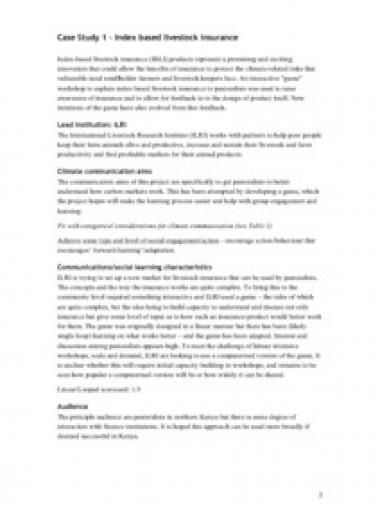Index Based Livestock Insurance (IBLI)

Index-based livestock insurance (IBLI) products represent a promising and exciting innovation that could allow the benefits of insurance to protect the climate-related risks that vulnerable rural smallholder farmers and livestock keepers face. An interactive "game" workshop to explain index based livestock insurance to pastoralists was used to raise awareness of insurance and to allow for feedback in to the design of product itself. New iterations of the game have also evolved from this feedback.
Lead institution: ILRI
The International Livestock Research Institute (ILRI) works with partners to help poor people keep their farm animals alive and productive, increase and sustain their livestock and farm productivity and find profitable markets for their animal products.
Climate communication aims:
The communication aims of this project are specifically to get pastoralists to better understand how carbon markets work. This has been attempted by developing a game, which the project hopes will make the learning process easier and help with group engagement and learning.
Communications/social learning characteristics:
ILRI is trying to set up a new market for livestock insurance that can be used by pastoralists. The concepts and the way the insurance works are quite complex. To bring this to the community level required something interactive and ILRI used a game – the rules of which are quite complex, but the idea being to build capacity to understand and discuss not only insurance but give some level of input as to how such an insurance product would better work for them. The game was originally designed in a linear manner but there has been (likely single loop) learning on what works better – and the game has been adapted. Interest and discussion among pastoralists appears high. To meet the challenge of labour intensive workshops, scale and demand, ILRI are looking to use a computerised version of the game. It is unclear whether this will require initial capacity building in workshops, and remains to be seen how popular a computerised version will be or how widely it can be shared.
Audience:
The principle audience are pastoralists in northern Kenya but there is some degree of interaction with finance institutions. It is hoped this approach can be used more broadly if deemed successful in Kenya.
Getting research into use (how this case study does or does not contribute to that):
This is a good example of linking a mainly formal private sector product – insurance – to informal sector pastoralists by acting as a knowledge broker. On one side the reputation of ILRI and their engagement with pastoralists holds some weight with finance institutions who also need educating on the needs of pastoralists, their willingness to pay and levels of demand to create a viable market. On the other side the pastoralists who have very little knowledge of insurance and what it can do for them but very high tacit knowledge of risk and possible livestock shock scenarios. By providing a catalyst to this exchange both sides have gained considerable knowledge and developed a fruitful relationship.
Evolution of the project (how has the project evolved or developed if known):
The project started in 2008, partly as a way to explain IBLI’s role but it has also provided a vehicle to generate insights into how people may respond to the presence of livestock insurance. The next phase of the project is looking at computerising the game.